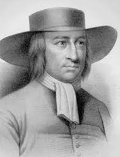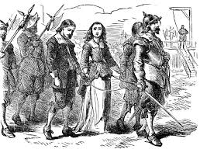The Society of Friends, more popularly known as the Quaker religion, began in England in the mid-17th Century. The founder, George Fox, didn't set out to set up a new faith.
Fox, born in 1624, grew up observing the Christian practices of his family and friends and noticed what he thought were puzzling things:
- Why did people who said that they believed so passionately in Christian ideals not live up to them?
- Why did people need to discriminate by social class or race or gender? Didn't Jesus say that all were welcome?
- Why did people feel the need to be addressed with titles, such as Sir or His Royal Highness?

Fox developed beliefs quite different from those around him. He believed that everyone had an "inner light," a part of God in them. Further, he believed that all people needed to worship God was to focus on that inner light. They didn't need to to obey a priest or to take part in a church service and its sacraments and rituals. Fox referred to churches as "steeple-houses."
In a way, these beliefs were an extension of the kind of personal relationship that the famed religious revolutionary Martin Luther had sought to advocate, when he argued that anyone should be able to read the Bible and have their own personal relationship with God. But the Christian denomination that Luther started still had sacraments and hymns and still advocated reading the Bible.
Fox wanted to know what made the Bible the final authority. He had read it, of course, and he considered it a source of great wisdom, a way to get to closer to God. But for Fox, God was already inside everyone and so reading the Bible wasn't a necessity.

These beliefs were quite radical, according to authorities in other religions. England at the time had an official state religion, the Church of England, and anyone who spoke out against the Church or its teachings or those who administered its teachings was said to be breaking the law and could be imprisoned. In the 16th and 17th Centuries, the various monarchs of England had gone back and forth between embracing Catholicism and the Church of England as the official religion, and prosecutions of people who were on the "wrong" side of whichever religion was sanctioned had been persecuted, prosecuted, imprisoned, and even executed. Fox's beliefs would have annoyed any monarch who considered himself or herself the head of the English church. In fact, a 1662 law known as the Quaker Act specifically required members of the Society of Friends to swear an oath of allegiance to the Crown.
Fox began to share his religious beliefs with others, and many people found his teachings welcome. It wasn't long before he was arrested and imprisoned. It was the first of eight such imprisonments for the determined Fox. He appeared before a group of magistrates in 1650 to answer to a charge of blasphemy. He wrote of this incident in his autobiography that one of the magistrates, Gervase Bennet, first referred to Fox and other Friends Quakers, "because I bade them tremble before the Lord." Fox and his fellow Friends embraced the intended epithet and began using it themselves.
Other names that the Friends more preferred were the Children of the Light and Friends in the Truth. The use of the word Friends came from a Bible verse. Jesus, as quoted in the New Testament gospel of John, said, "You are my friends if you do whatever I command."
The Friends believed in wearing plain dress, to reinforce the humility that they naturally felt and as a way to set themselves aside from the temptations of earthly wealth. They also, in the early years especially, used now-archaic forms of address, such as "thee" and "thou."
In 1652, Fox met Margaret Fell. She, too, was an early leader in the Friends movement, and her home, Swarthmoor Hall, was a Friends meeting place for a time. Fox and Fell married in 1667. By this time, the number of Quakers in England had topped 50,000.
Part 2: Worldwide Expansions